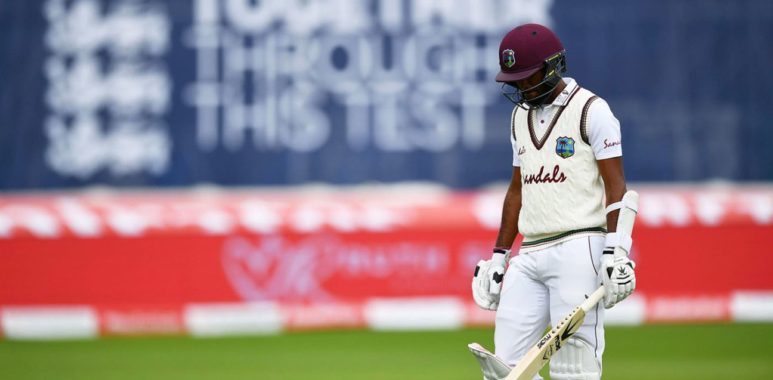
West Indies’ listless batsmen owe their fast bowlers an apology
What exactly did West Indies’ batsmen learn between the second and third Tests? They had to bat time on the final day of both matches. Both days, they walked back defeated.
On the final day of the second Test, they managed to survive 70.1 overs out of the 85 they needed to. Today they struggled to last just 37.1 overs, having been tasked to be vigilant for 98.
It was shambolic and embarrassing. Every specialist batsman showed the resolve of a child spotting an ice-cream truck. None gave the impression that he understood what the batting group’s main goal was: to bat out the balls they needed to.
Jermaine Blackwood was the only visiting batsman today who lasted an hour. The rest of the batting line-up were easily distracted, and lured into the playing shots at balls they could easily have left alone. They were easy pickings for Stuart Broad and Chris Woakes, who barely broke a sweat between them on a breezy, rainy final day of this first-ever biosecure Test series played behind closed doors.
To understand how listless West Indies and how confident England’s bowlers were, you should have heard Broad recounting an anecdote from fourth day after the victory. Broad said that James Anderson had pointed to Windies opener Kraigg Brathwaite and said it was a matter of time before he would become Broad’s 500 Test victim.
Both great bowlers had a chuckle. As it happens, Brathwaite was Anderson’s 500th Test wicket during the 2017 tour of England. Brathwaite might as well make 500 the number he wears on his Test shirt, if the ICC allows.
But it is not about being a laughing stock, Brathwaite must understand. His fraught technique, where he bats back and across, not knowing where his off-stump is despite taking an off-stump guard, has contributed to his string of failures, especially in the second innings.
Today, he was defeated by a Broad ball that had pitched on the seam, on a good length, on the fourth stump before darting in low and fast to hit his raised back leg. Brathwaite could have played on the front foot, but his defensive mindset exposed him, resulting in him getting squared up.
ALSO READ: Why Hope’s Headingley opus might not sustain him much longer
On the flight back tomorrow Shai Hope will definitely think about several what-ifs. One simple question he should be asking himself is: was it really necessary to pull a short ball, trying to shovel it from wide outside off stump, only to balloon an easy catch to mid-on? And that too 45 minutes from lunch, not long after Brathwaite had departed?
The stroke that Hope attempted today is a stroke batsmen play predominantly in limited-overs cricket when they spot the mid-on fielder well inside the circle. Were West Indies actually playing for a win today? Hope’s highest score in his six innings in this series was 31, which came today. Questions about his future are certain now.
Hope’s was not the only self-inflicted blunder. Similar examples of loose decision-making included: Shamarh Brooks playing at a straight ball that needed to be left alone; Roston Chase – who had proved to be the most reliable player – stuttering to respond to call from Blackwood late and turning an easy run into a run-out; Jason Holder failing to take a stride forward against a length ball that trapped him plumb; and ditto Shane Dowrich. Such benevolence helped Woakes to quietly steal a five-for without being particularly scheming.
At about half past two in the afternoon, minutes after he had got out, Holder was caught by the TV cameras holding his head in his hands. That was she same head that was held proudly aloft on the final afternoon in Southampton, after Holder and Blackwood had led West Indies to a historic victory to take the series lead. Prime ministers would call Holder to tell him how proud they were he had kept a cool head to take West Indies past the finishing line.
“To win the minor battles, you need presence of mind, too. West Indies were bowled out six minutes before three o’clock. Less than half an hour later it was raining heavily.”
From those giddy heights, about a week later, Holder could not believe his batsmen had failed to show the spine to withstand the mounting pressure from Broad and co. as they were bowled out twice in two days, despite sitting pretty before the final session on the penultimate day of the second Test.
Another week later, Holder said he could not explain what exactly had happened that West Indies had lost the series 2-1. England has never been an easy place for visiting teams to win especially this decade where there have been beaten only once – in 2014 by Sri Lanka.
Yet Holder and his troops had been gung-ho having won the home series against England in 2019. That victory was possible because some of their batsmen had excelled at home – including Holder, who had blasted a maiden double-century.
This time around, West Indies breached the 300-run mark just once – in the first innings of the first Test. That total had allowed their fast bowlers – led by Holder and Shannon Gabriel – to attack England.
To put those failings into context, this was first time since 1928 that no West Indies batsman recorded a single Test century against England. It was also only the fifth instance of zero centuries in Test series comprising at least three matches for West Indies.
This series West Indies managed just 23.73 runs per wicket which was marginally better than their 2017 trip to England. However, last year when West Indies won the series at home against England that figure was a healthy 31.15. Their top three averaged 20.29 which is the second-lowest against England.
At the outset of the series Windies batting great Brian Lara had pointed out that the key to succeed in England is to protect your stumps. However this West Indies batting unit’s defence has been too porous: there were 19 lbw dismissals, which is the second-highest count in a three-Test series for them.
West Indies batsmen need to think hard. They are not just letting themselves down, but also their fast bowlers, who strived and fought through the pain of bowling not just in back-to-back Test matches, but also long tireless spells.
Can they look in the eye of Gabriel, who was playing in his first Test series since surgery last September and was stiff after his match-winning spell in Southampton? Can they do the same with Kemar Roach, who toiled endlessly throughout the series and finally got to the milestone of 200 Test wickets, but could not celebrate the feat? The fast bowlers need an apology.
It is not just about the technique and mental strength that makes Test cricket the pinnacle. To win the minor battles, you need presence of mind, too. West Indies were aware on Tuesday that play would be hampered by frequent showers. West Indies were bowled out six minutes before three o’clock. Less than half an hour later, it was raining heavily at Old Trafford.
Michael Holding had the first word in this series, calling “timber” after Gabriel bent back Dom Sibley’s off stump to take the first wicket in this series. Holding had the last word, too. He got a message from a friend in the Caribbean who wanted to check if the rain could save West Indies this afternoon. Holding’s response was: “The Lord only helps those who help themselves.”
With stats inputs from S Rajesh

